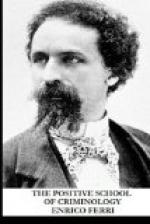We arrive, then, at this scientific conclusion: In the society of the future, the necessity for penal justice will be reduced to the extent that social justice grows intensively and extensively.
III.
In the preceding two lectures, I have given you a short review of the new current in scientific thought, which studies the painful and dangerous phenomena of criminality. We must now draw the logical conclusions, in theory and practice, from the teachings of experimented science, for the removal of the gangrenous plague of crime. Under the influence of the positive methods of research, the old formula “Science for science’s sake” has given place to the new formula “Science for life’s sake.” For it would be useless for the human mind to retreat into the vault of philosophical concentration, if this intellectual mastery did not produce as a counter-effect a beneficent wave of real improvement in the destinies of the human race.
What, then, has the civilized world to offer in the way of remedies against criminality? The classic school of criminology, being unable to locate in the course of its scientific and historical mission the natural causes of crime, as I have shown in the preceding lectures, was not in a position to deal in a comprehensive and far-seeing manner with this problem of the remedy against criminality. Some of the classic criminologists, such as Bentham, Romagnosi, or Ellero, with a more positive bent of mind than others, may have given a little of their scientific activity to the analysis of this problem, namely the prevention of crime. But Ellero himself had to admit that “the classic school of criminology has written volumes concerning the death penalty and torture, but has produced but a few pages on the prevention of criminality.” The historical mission of that school consisted in a reduction of punishment. For being born on the eve of the French revolution in the name of individualism and natural rights, it was a protest against the barbarian penalties of the Middle Ages. And thus the practical and glorious result of the classic school was a propaganda for the abolition of the most brutal penalties of the Middle Ages, such as the death penalty, torture, mutilation. We in our turn now follow up the practical and scientific mission of the classic school of criminology with a still more noble and fruitful




